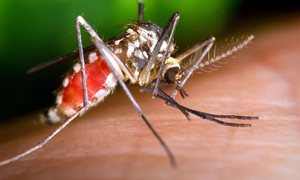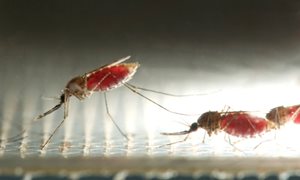28 July 2020
During the wave of COVID-19 patients that flooded Dutch hospitals in the first half of 2020, two young brothers became seriously ill with the SARS-CoV-2 virus and had to be mechanically ventilated in the ICU. One of them died from the consequences of the infection, the other recovered. The severe course of disease in otherwise healthy young brothers was a relatively rare occurrence, especially because the virus mainly affects the elderly. This observation triggered the curiosity of an attentive physician from the MUMC+ department of clinical genetics. She contacted her colleagues in Nijmegen who then investigated why these two young brothers were so severely affected.
"This discovery not only provides us with more insight into the fundamental workings of the immune system, but it may also have important consequences for the treatment of severely ill COVID-19 patients," says Frank van de Veerdonk, theme Infectious diseases and global health, “The substance interferon can be given as a therapy. It is currently being investigated whether administering interferon in COVID-19 can indeed help.”
Video

During the wave of COVID-19 patients that flooded Dutch hospitals in the first half of 2020, two young brothers became seriously ill with the SARS-CoV-2 virus and had to be mechanically ventilated in the ICU. One of them died from the consequences of the infection, the other recovered. The severe course of disease in otherwise healthy young brothers was a relatively rare occurrence, especially because the virus mainly affects the elderly. This observation triggered the curiosity of an attentive physician from the MUMC+ department of clinical genetics. She contacted her colleagues in Nijmegen who then investigated why these two young brothers were so severely affected.
Genetic factors
"In such a case, you immediately wonder whether genetic factors could play a role," says geneticist Alexander Hoischen, theme Infectious diseases and global health. “Getting sick from an infection is always an interplay between - in this case - the virus and the human immune system. It may be a mere coincidence that two brothers from the same family become so severely ill. But it is also possible that an inborn error of the immune system has played an important role. We investigated this possibility, together with our multidisciplinary team at Radboudumc.”One X-chromosome
All genes (collectively called the exome) of both brothers were sequenced, after which the investigators combed through the data searching for a possible shared cause. Cas van der Made, PhD student and resident at the department of Internal Medicine: “We mainly looked at genes that play a role in the immune system. We know that several of these genes are located on the X-chromosome, and with two brother pairs affected X-chromosomal genes were most suspicious. Women carry two X-chromosomes, while men possess a Y-chromosome apart from the X. Therefore, men have only one copy of the X-chromosomal genes. In case men have a defect in such a gene, there is no second gene that can take over that role, as in women.”Gene identification
That search quickly revealed mutations in the gene encoding for the Toll-like receptor 7, TLR7 for short. There are multiple TLR-genes, which belong to a family of receptors with an important role in the recognition of pathogens (such as bacteria and viruses) and the activation of the immune system. Hoischen: “A few letters were missing in the genetic code of the TLR7 gene. As a result, the code cannot be read properly and hardly any TLR7 protein is produced. TLR7 function has so far never been associated with an inborn error of immunity. But unexpectedly we now have an indication that TLR7 is essential for protection from this coronavirus. So it seems that the virus can replicate undisturbed because the immune system does not get a message that the virus has invaded. Because TLR7, which must identify the intruder and subsequently activate the defense, is hardly present. That could be the reason for the severity of the disease in these brothers.”Additional confirmation
Then, quite unexpectedly, the doctors and researchers at Radboudumc come across another pair of brothers who have fallen seriously ill with COVID-19. Again, they are both under 35 years of age. Both of them were also in the ICU for mechanical ventilation. "Then the question of the role of genetics became even more obvious." says Hoischen. “We also investigated the genetic code of these two brothers, again via the 'rapid-clinical exome' method. This time we saw no deletion, no loss of letters, but a single spelling mistake of one DNA-letter of the TRL7 gene. The effect on the gene is the same, however, because these brothers also do not make sufficient functional TLR7 protein. Suddenly we had four young people with a defect in the same gene, all of whom had fallen seriously ill from the SARS-CoV-2 virus.”Essential role in the defense
Van der Made and colleagues have investigated the consequences of improper functioning of the TLR7 receptor. "Once activated, TLR7 triggers the production of so-called interferons, signaling proteins that are essential in the defense against virus infections," says van der Made. “This immune response is perhaps all the more important in the fight against the SARS-CoV-2 virus, because we know from the literature that the virus has tricks to reduce the production of interferons by immune cells. When we mimic an infection with the coronavirus, we see that immune cells of the patients without properly functioning TLR7 hardly respond, and that minimal amounts of interferons are produced. These tests make it clear that the virus appears to have free rein in people without properly functioning TLR7 because it [the virus] is not recognized by the immune system.”Consequences
"Due to the serious illness of four brothers in two families, so serious that it cost one of the young men his life, we have discovered this condition," says Hoischen. “It seems to be a very specific abnormality, an immunodeficiency, which is mainly related to this coronavirus. None of the four men have previously suffered from immune-related diseases. It is the first time that we can connect a clinical phenomenon so strongly with TLR7.”"This discovery not only provides us with more insight into the fundamental workings of the immune system, but it may also have important consequences for the treatment of severely ill COVID-19 patients," says Frank van de Veerdonk, theme Infectious diseases and global health, “The substance interferon can be given as a therapy. It is currently being investigated whether administering interferon in COVID-19 can indeed help.”
Video
Related news items

Grants for research on magnesium deficiency and malaria Vidis for Felix Hol and Jeroen de Baaij
1 July 2022 Radboudumc researchers Jeroen de Baaij and Felix Hol both receive an NWO Vidi grant for their research, respectively on magnesium deficiency in type 2 diabetes and on malaria. go to page
Field research on malaria vaccine offers unexpected surprise
23 May 2022Field research on the effectiveness of a malaria vaccine, came up with unexpected results for an international group of researchers including Benjamin Mordmüller of Radboudumc. The vaccine evokes a broader response against malaria proteins than there are in the vaccine.
go to page
Rubicon grants awarded to three RIMLS researchers
19 April 2022Three researchers have received Rubicon funding from NWO/ZonMw. This will enable Elke Muntjewerff, Laura de Vries and Laurens van de Wiel to do research at a foreign research institute for the next two years.
go to page


